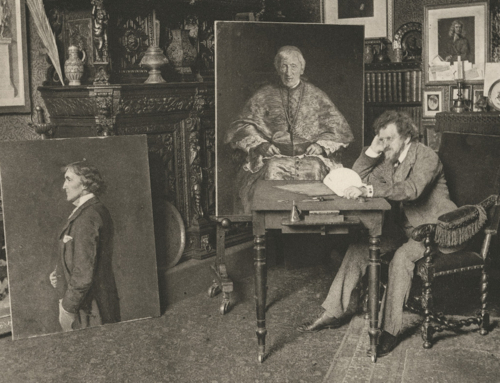By God’s grace, you made it to heaven, and now you’re at the Awards Ceremony of the Heavenly Banquet.
St. Peter’s the emcee of the event. He’s been calling out the names of the elect and handing out awards for what feels like the last forty days and forty nights. There have been prizes for all kinds of saintly feats. In the last ten minutes alone, he’s announced the Most Zealous Preacher (St. Dominic, of course), Most Improved Player (St. Paul), Most SPIs (Souls Prayed In), Most Hours Spent Hearing Confessions in One Day (St. Padre Pio, who held the record at thirty-six, but he had been bi-locating), and Most Devout First Communion (Bl. Imelda). Now St. Peter calls your name and from the back table you can hear your great-aunt give a loud, encouraging hoot. What award will I get? you think, as you make your way to the front of the room. Most Penitential Morning Commute? Most Meritorious Diaper Change? Silliest Spontaneous Prayer?
“Congratulations on receiving the Participation Award,” St. Peter says, and hands you an eight-by-eleven paper certificate.
You politely thank St. Peter and shuffle back to your seat embarrassed, recalling the time in fifth grade when Mrs. Moorhen gave you a green sock puppet as a participation prize after the school spelling bee. On your way back, you pass the next person going up to receive his award. It’s St. Sebastian, covered in arrows from his holy death. Great, you think (in a charitable sort of way), He’s probably going to get Most Manly Martyrdom. But as you’re sitting down, you hear St. Peter say, “Sebastian, congratulations on receiving the Participation Award.” And St. Sebastian gives him a manly handshake. When St. Peter calls the next person (who happens to be Mrs. Moorhen), the same thing happens: “Doris, congratulations on receiving the Participation Award.” Over the course of the next few hours, the only award given is for participation, and even the saints whose names had been called before come up again to receive their certificate.
Then, St. Peter calls a name everyone recognizes: “The Blessed Virgin Mary.” At the sound of her name, the crowd erupts in thunderous applause. In the back, your great aunt is jumping up and down on a table with a Carmelite nun chanting “Hail Mary! Hail Mary! Hail Mary!” Everyone’s cheering for the Mother of God. As Mary reaches St. Peter, an old hermit shushes the crowd and the heavenly hall falls silent.
“Congratulations on receiving the Participation Award,” St. Peter says, and hands Our Lady an eight-by-eleven paper certificate.
***
Why are the blessed in heaven praised for their participation? Doesn’t that sound a little, well, lame for heaven? It’s akin to “damning with faint praise,” as the Bard says.
For the saints, a Participation Award is not given as a self-esteem booster (though, to be clear, there’s not really an Award Ceremony in heaven, as far as I know), but as a reflection of the reality of sanctity. For participation (on a metaphysical level) best describes the way that the saints (and all creatures, for that matter) relate to God.
To participate means to take a part of something, or more precisely, to receive and possess in a partial way what belongs to somebody else in a total way. On a natural level, every creature that exists participates in God, who is Existence Itself. The act of existing belongs totally to God. Creatures only exist in a partial way. Their being doesn’t comprise the whole spectrum of existence like God does. Rather, they receive a share in His existence. They participate in God, who revealed himself to Moses as the One Who Is: “I AM WHO AM” (Exod 3:14). Every creature exists because it takes part in God’s existence. To quote St. Thomas Aquinas, “All beings apart from God are not their own being, but are beings by participation,” while God “possesses being most perfectly” (ST I. 44. 1).
While everything that is participates in God’s being, everyone who is holy participates in God’s holiness, by receiving the gift of grace and so taking part in God’s Divine Life. For to be holy is to participate in the eternal life of God, a foretaste of heaven. This is why everyone in heaven gets the Participation Award. Not as an affirming acknowledgment for what they have achieved, but as a reflection of the way God has chosen to save them—that is, by letting them share in the joy of His heavenly life.
The saints want to be known merely for participating in God. Participation is what they aim for. We hear this in St. Paul’s boast: “I have been crucified with Christ; it is no longer I who live, but Christ who lives in me” (Gal 2:20); in St. John the Baptist’s mission statement: “He must increase, but I must decrease” (Jn 3:30); in God the Father’s revelation to St. Catherine of Siena: “You are she who is not, I am he who is.”
Most especially we hear it in Mary’s song of praise—the canticle that will echo through the Church for all generations: “My soul magnifies the Lord, and my spirit rejoices in God my Savior, for he has regarded the low estate of his handmaiden” (Lk 1:46-48).







